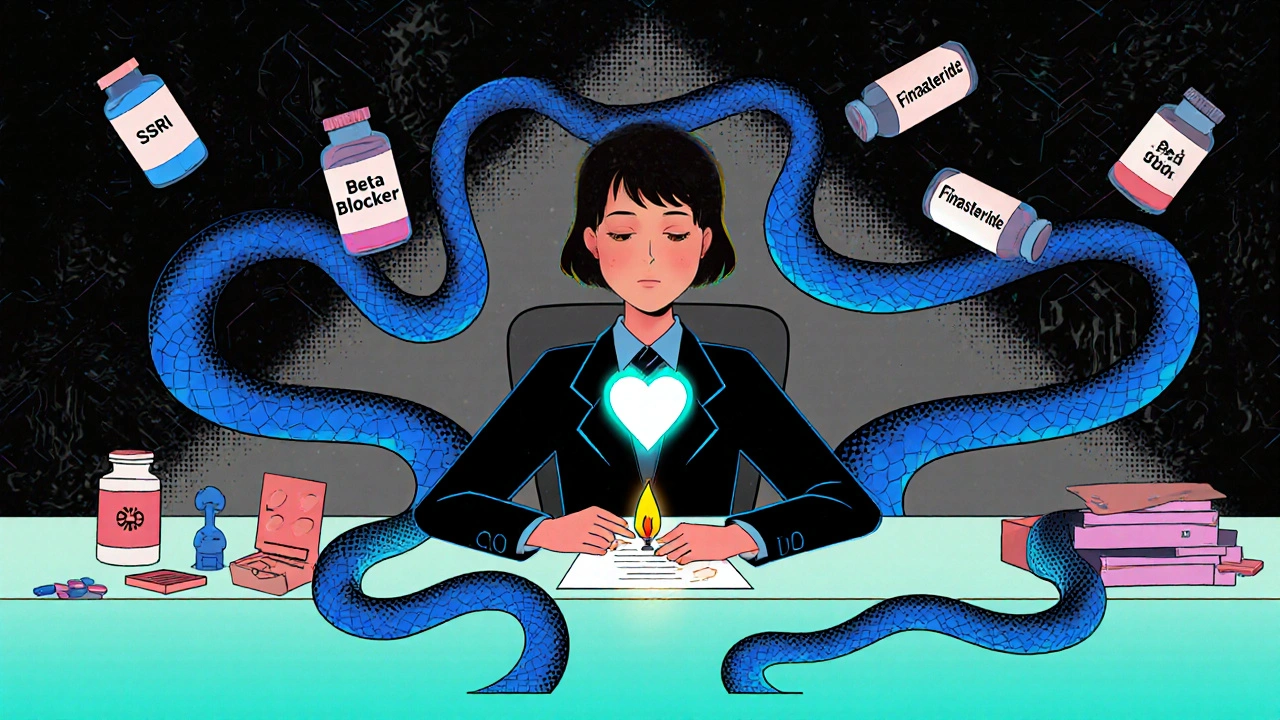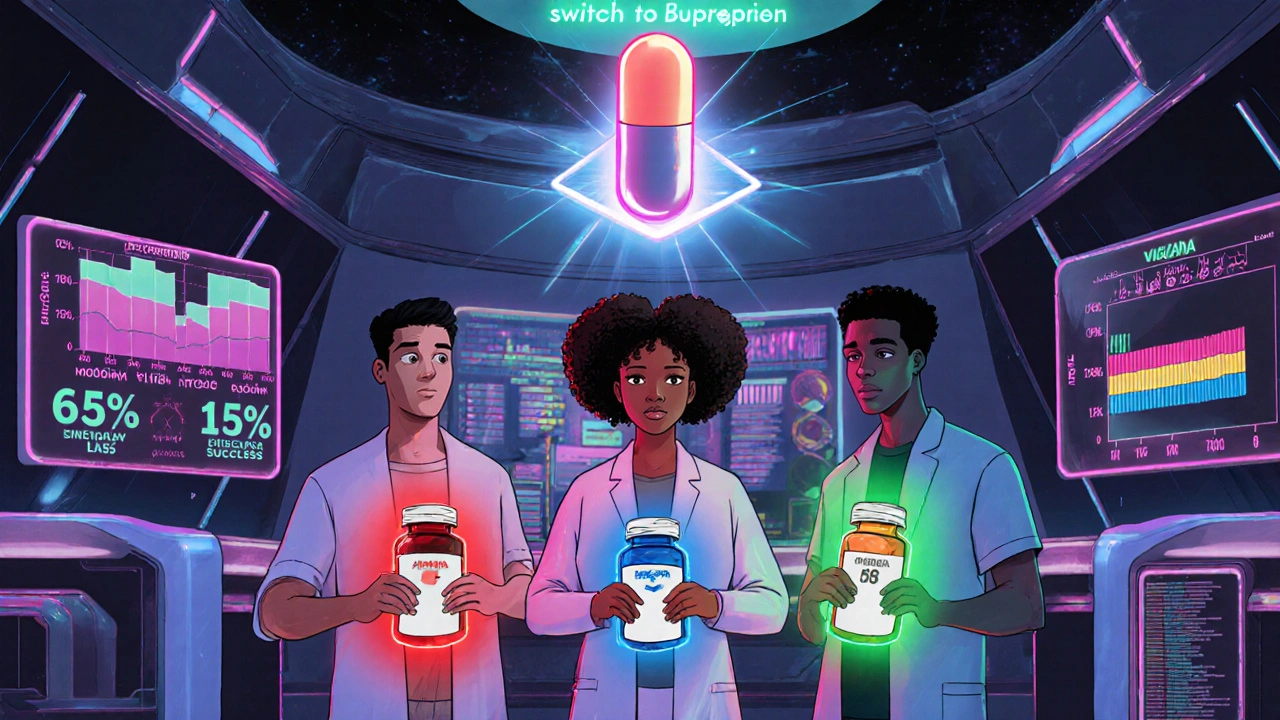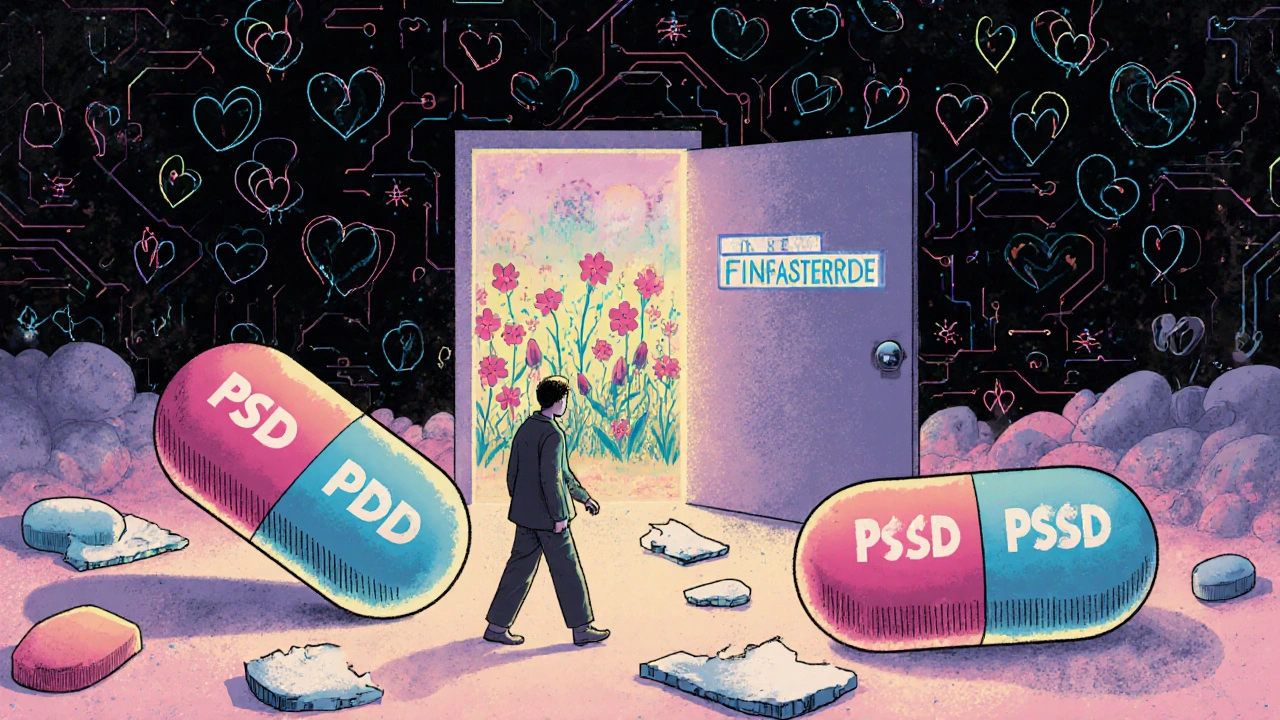Sexual Side Effects from Common Medications: What You Need to Know

Medication Side Effect Checker
Medication Side Effect Checker
Select your medication to see sexual side effect risks and explore alternatives
It’s not rare to hear someone say, "I’m taking this pill for my depression, but I don’t want to have sex anymore." Or, "My blood pressure med is working, but I can’t get an erection." These aren’t rare complaints-they’re common, and they’re often ignored. If you’ve noticed a drop in libido, trouble getting or keeping an erection, delayed or absent orgasm, or reduced pleasure during sex, it might not be your mind or your relationship. It could be your medication.
Antidepressants Are the Biggest Culprit
Antidepressants, especially SSRIs, are the most frequent cause of sexual side effects. About 40% of people taking them experience some form of sexual dysfunction, according to decades of clinical research. For some, it’s a mild annoyance. For others, it’s a deal-breaker that leads to stopping treatment altogether. Among SSRIs, the risk varies widely. Paroxetine (Paxil) has the highest rate-up to 65% of users report sexual problems. Fluvoxamine (Luvox) follows at 59%, then sertraline (Zoloft) at 56%, and fluoxetine (Prozac) at 54%. These aren’t guesses-they’re numbers from large, real-world studies of thousands of patients. The problem? SSRIs boost serotonin, which helps with mood, but also shuts down sexual response pathways in the brain. This can mean:- Lower desire (libido)
- Difficulty getting or maintaining an erection
- Delayed or no orgasm
- Reduced pleasure during sex
- In rare cases, numbness in genitals or painful ejaculation
Not all antidepressants are the same. Bupropion (Wellbutrin) and mirtazapine (Remeron) are much less likely to cause these issues. In fact, some people report improved sex drive on bupropion. If sexual side effects are a major concern, switching to one of these may be a better option than quitting your antidepressant entirely.
Heart Medications Can Kill Your Sex Life Too
High blood pressure and heart disease are serious. But the meds used to treat them can make sex harder-or impossible. Thiazide diuretics like hydrochlorothiazide (Microzide) are the most common cause of erectile dysfunction among blood pressure drugs. About 10% of heart failure patients link their sexual problems directly to these medications. Beta blockers like atenolol and metoprolol are next on the list, often reducing arousal and making it harder to reach orgasm. For women, the impact is just as real. Up to 41% report lower desire, and 34% say sex is less pleasurable. Some drugs, like clonidine and prazosin, are especially bad for libido. But here’s the good news: not all blood pressure meds are equal. Angiotensin II receptor blockers like valsartan have actually been shown to improve sexual desire and fantasies in women compared to beta blockers. If you’re on a blood pressure med and having sexual issues, ask your doctor if switching to an ARB could help.Prostate and Hormone Drugs Are Designed to Shut Down Sex
Men taking 5-alpha reductase inhibitors like finasteride (Propecia) or dutasteride (Avodart) for hair loss or enlarged prostate often see sexual side effects. About 6-16% report lower libido, 5-9% have erectile dysfunction, and up to 21% experience problems with ejaculation. These drugs work by blocking DHT, a hormone tied to both hair growth and sexual function. Even more drastic are antiandrogens like bicalutamide, used in prostate cancer treatment. Nearly all men on these drugs lose libido, struggle with erections, and may develop breast tissue (gynecomastia). These effects are expected-and often accepted as part of fighting cancer. But that doesn’t make them easier to live with. Pre-treatment counseling is key.
Other Surprising Offenders
It’s not just antidepressants and heart meds. Other common drugs can mess with your sex life too:- Gabapentin and pregabalin (used for nerve pain and seizures) can lower testosterone and cause erectile dysfunction.
- Opioids like oxycodone disrupt the hormone system, leading to low testosterone and sexual dysfunction.
- Proton pump inhibitors (PPIs) like omeprazole (Prilosec) have been linked to reduced libido and erection problems in some users, though the exact reason isn’t clear.
- Clomipramine, a tricyclic antidepressant, caused total or partial inability to orgasm in 93% of patients in one study.
Even some over-the-counter meds and supplements can play a role. Herbal products like saw palmetto or high-dose zinc have been tied to reduced libido in anecdotal reports. Always tell your doctor about everything you’re taking-not just prescriptions.
What Can You Do About It?
The worst thing you can do is suffer in silence and quit your meds cold turkey. That can lead to withdrawal, relapse, or worse health outcomes. Here’s what actually works:- Talk to your doctor. Don’t assume they know you’re having problems. Many doctors don’t ask. Bring it up yourself.
- Ask about alternatives. Can you switch from paroxetine to bupropion? From hydrochlorothiazide to valsartan? There are often better options.
- Try a "drug holiday." For some SSRIs, taking a break on weekends (under medical supervision) can help restore sexual function without losing mental health benefits.
- Time your dose. Some people find taking their SSRI after sex reduces interference with arousal and orgasm.
- Consider adding a PDE5 inhibitor. Sildenafil (Viagra), tadalafil (Cialis), or vardenafil (Levitra) can help with SSRI-induced erectile dysfunction. Studies show 74-95% success rates in these cases.
- Exercise regularly. Physical activity boosts blood flow, improves mood, and naturally increases testosterone. It’s one of the few interventions that helps both mental and sexual health.
Don’t let shame keep you quiet. Sexual side effects are a known, documented, and treatable part of many medications. You’re not broken. You’re not alone. And there are solutions.

When to Be Worried
Most sexual side effects are uncomfortable but not dangerous. But some need immediate attention:- Priapism: An erection lasting more than 4 hours. This is a medical emergency-it can cause permanent damage.
- Severe numbness or pain in genitals. Especially if it doesn’t go away after stopping the drug.
- Sudden loss of libido with fatigue, low energy, or depression. Could signal low testosterone from long-term opioid or steroid use.
If you experience any of these, contact your doctor right away. Don’t wait.
What’s Changing in 2025?
The medical world is finally catching up. More drug trials now include sexual function as a standard outcome measure. The FDA requires sexual side effect reporting for many new CNS drugs. Researchers are developing next-gen antidepressants that don’t spike serotonin as much, aiming to keep mood benefits without killing desire. Guidelines from the American Urological Association now recommend routine screening for medication-induced sexual dysfunction during checkups-especially for people on long-term antidepressants, blood pressure meds, or prostate drugs. The future? Personalized medicine. Genetic testing may soon tell you if you’re more likely to have sexual side effects from certain drugs. That means your next prescription could be chosen not just for effectiveness, but for how it affects your whole life-including your sex life.Can sexual side effects from medications be permanent?
In most cases, sexual side effects go away after stopping the medication. But for some people-especially those on long-term SSRIs or 5-alpha reductase inhibitors like finasteride-symptoms can persist for months or even years after discontinuation. This is called Post-SSRI Sexual Dysfunction (PSSD) or Post-Finasteride Syndrome. While rare, it’s real and documented in medical literature. If symptoms last more than 3 months after stopping the drug, see a specialist.
Do all SSRIs cause the same sexual side effects?
No. While all SSRIs can cause sexual side effects, the risk varies significantly. Paroxetine has the highest rate (65%), followed by fluvoxamine and sertraline. Fluoxetine and escitalopram have slightly lower rates. Bupropion, though not an SSRI, is often used as an alternative because it rarely causes sexual problems and may even improve libido.
Can I take Viagra with my antidepressant?
Yes, in most cases. Sildenafil (Viagra), tadalafil (Cialis), and vardenafil (Levitra) are commonly prescribed alongside SSRIs to treat erectile dysfunction caused by antidepressants. Studies show success rates of 74-95% in these patients. Always check with your doctor first, especially if you’re on nitrates or have heart conditions.
Why don’t doctors talk about this more?
Many doctors assume patients won’t bring it up, or they’re focused on treating the primary condition-depression, high blood pressure, etc. Others worry about causing embarrassment. But research shows patients want to talk about it. If your doctor doesn’t ask, ask them. It’s your health, and your sex life matters.
Are there natural ways to reverse medication-induced sexual dysfunction?
Exercise is the most proven natural method-it improves blood flow, hormone levels, and mood. Reducing alcohol and quitting smoking also help. Some supplements like L-arginine or ginseng are marketed for sexual health, but evidence is weak. Don’t replace medical advice with unproven remedies. Talk to your doctor before trying anything new.
Can women experience sexual side effects from these medications too?
Absolutely. Women report reduced libido, difficulty with arousal, delayed or absent orgasm, and reduced vaginal lubrication. SSRIs and blood pressure meds affect women just as much as men, though the symptoms may look different. Many women assume it’s "just aging" or stress, but it’s often the medication. Don’t ignore it.

robert cardy solano
November 19, 2025 AT 20:26Been on sertraline for three years. Lost my sex drive so hard I forgot what it felt like. Tried everything-therapy, exercise, timing doses. Nothing worked until I switched to bupropion. My libido came back like I’d been asleep for a decade. Doctors never mention this stuff. You gotta be your own advocate.
swatantra kumar
November 21, 2025 AT 15:54Brooooooo 🤯 I was on paroxetine for 18 months and thought I was broken. Turned out it was the pill. Switched to Wellbutrin and now I’m back in business. Also, my dog started wagging his tail again. Coincidence? I think not. 🐶❤️
Cinkoon Marketing
November 21, 2025 AT 16:31Interesting how they mention ARBs helping women’s libido-most studies still focus on men. I’m on losartan and honestly, I’ve noticed more interest in intimacy since switching from metoprolol. Maybe it’s placebo? Or maybe doctors just don’t ask women the right questions. 🤔
Nick Naylor
November 23, 2025 AT 12:24Let’s be clear: SSRIs are pharmaceutical tyranny disguised as treatment. You’re trading your humanity for a mood stabilizer. And don’t get me started on the FDA’s toothless reporting requirements. We’re not talking about a headache-we’re talking about the erasure of one of the most fundamental human drives. This isn’t medicine. It’s chemical castration with a side of antidepressant.
And yes, I’ve seen men on finasteride lose their identity. Their wives leave. Their self-worth evaporates. And the medical community shrugs. Why? Because sex isn’t ‘life-saving.’ It’s a luxury. And in America, luxuries are expendable.
Meanwhile, Big Pharma keeps selling these drugs like candy. They don’t care about PSSD. They don’t care about Post-Finasteride Syndrome. They care about quarterly earnings. And you? You’re just a data point in a clinical trial.
It’s not just side effects. It’s systemic betrayal. And until we start treating sexual health as essential-not optional-we’re all just waiting for our turn to be chemically neutered.
Pawan Jamwal
November 24, 2025 AT 18:34Why do Americans always act like this is new? In India, we’ve known for decades that SSRIs kill libido. Even our Ayurvedic doctors warn against long-term SSRI use without monitoring testosterone. But no one listens. Because Western medicine thinks it owns the truth. Meanwhile, people suffer in silence. And then they blame themselves.
Also-Viagra with SSRIs? That’s like putting a Band-Aid on a severed artery. You’re masking the problem, not fixing the root. Switch the drug. Don’t patch it.
Bill Camp
November 24, 2025 AT 21:52THIS IS A NATIONAL EMERGENCY. People are being drugged into emotional and sexual zombies and no one’s talking about it. You think your boss cares if you can’t get it up? No. You think your insurance company cares? No. They want you to keep taking the pill. Keep paying. Keep silent. This is a quiet genocide of desire-and it’s being covered up by white coats and profit margins.
Lemmy Coco
November 26, 2025 AT 01:10just switched from zoloft to wellbutrin last month… sex drive is back but now i cant sleep… also my teeth feel weird… is this normal? idk what to do anymore
rob lafata
November 27, 2025 AT 19:13Oh, so now we’re treating sex like a side effect? Like it’s some afterthought you can just ignore while you’re busy saving lives? Pathetic. You’re not treating depression-you’re turning people into walking, talking, emotionally flat zombies who can’t even feel pleasure. And you call that progress? This isn’t medicine. This is corporate eugenics disguised as pharmacology.
And don’t give me that ‘talk to your doctor’ crap. Most doctors are too lazy to read the studies. They just prescribe the latest FDA-approved toy and move on. You think your GP knows what PSSD is? No. They’ve never heard of it. Because Big Pharma doesn’t want them to.
Meanwhile, your libido’s dead. Your partner’s leaving. Your self-esteem’s in the toilet. And the only thing left to do? Take another pill. And another. And another. Until you’re nothing but a ghost in a prescription bottle.
It’s not a side effect. It’s a crime.
Matthew McCraney
November 29, 2025 AT 14:15They’re hiding this on purpose. I read somewhere that the FDA knew about PSSD in the 90s but buried it because the drugs made too much money. And now? They’re calling it ‘rare’ so they don’t have to warn people. It’s not rare. It’s just covered up. I know a guy who took Prozac for 5 years. Stopped. Now it’s been 7 years. Still can’t get hard. Still can’t feel anything. His wife left. His kids don’t know him. And the doctors? They just shrugged. This isn’t medicine. This is a cover-up. They’re killing people’s souls and calling it treatment.
serge jane
November 30, 2025 AT 16:21There’s a deeper question here that no one’s asking: Why do we accept the erosion of human experience as the price of mental health stability? We treat depression like a broken circuit that needs a voltage boost. But what if the circuit isn’t broken? What if it’s just been starved of meaning? Of connection? Of joy that doesn’t come from a pill?
Maybe the real problem isn’t serotonin levels. Maybe it’s a society that has forgotten how to be present. How to touch. How to desire without being medicated into submission. We’ve outsourced intimacy to pharmacology because we’re too afraid to sit with our pain. We’d rather numb it than feel it.
And so we trade sex for stability. Pleasure for peace. And call it progress. But what kind of peace is it when you can’t feel your own skin? When your body feels like a stranger’s?
I don’t have an answer. But I think we need to ask better questions.